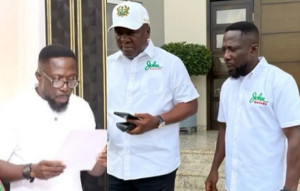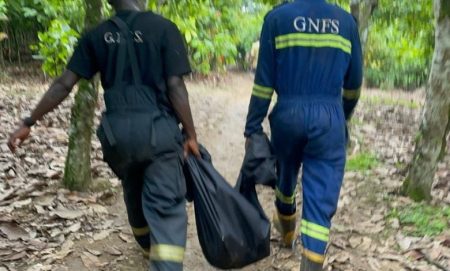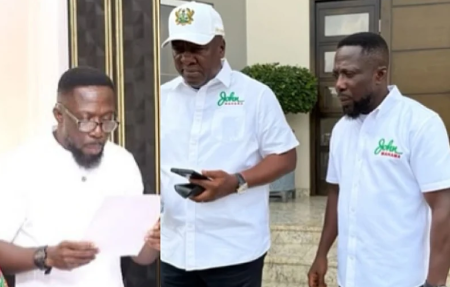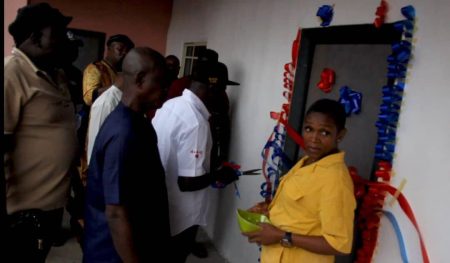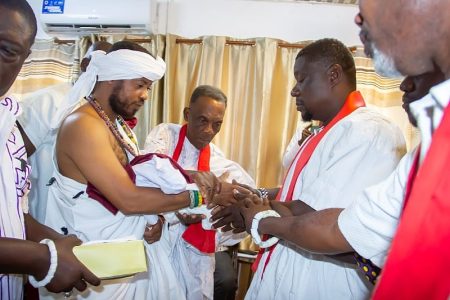The Economic and Organized Crime Office (EOCO), Ghana’s leading agency tasked with combating economic and organized crime, recently conducted a raid on the residence of renowned dancehall artist, Shatta Wale. This action, shrouded in a degree of ambiguity regarding its exact timing and specific justifications, has sparked considerable controversy and ignited a fiery public exchange between the artist and the agency. While EOCO remains officially silent on the details, unconfirmed reports suggest the raid is connected to an ongoing investigation into the legitimacy and ownership of some of Shatta Wale’s luxury vehicles, with the artist allegedly having been under EOCO’s surveillance prior to the operation.
The raid quickly escalated into a public spectacle when Shatta Wale took to social media to express his outrage and vehemently criticize EOCO and its Executive Director, Raymond Archer. Shatta Wale’s pronouncements were highly charged, accusing Archer of orchestrating a politically motivated attack aimed at sabotaging the National Democratic Congress (NDC), the main opposition party in Ghana. He explicitly linked Archer’s actions to potential damage to the NDC’s electoral prospects in the next general elections, suggesting a calculated move to undermine the party’s standing. This politically charged accusation immediately amplified the incident’s significance, transforming it from a seemingly isolated event into a potentially politically sensitive affair.
Shatta Wale’s online outburst continued with further accusations against Archer, claiming he abused his authority and subjected ordinary Ghanaians to humiliation under the guise of law enforcement. He directly challenged the EOCO director, emphasizing that his position was not meant for the harassment of citizens, implicitly invoking a sense of public accountability and the proper exercise of power. The artist’s public condemnation of EOCO’s conduct reflected not only his personal grievance but also tapped into broader public concerns about the potential overreach of law enforcement agencies and the safeguarding of individual rights.
The repercussions of the raid and Shatta Wale’s subsequent public response have been swift and far-reaching. The incident has fueled intense online debate, with discussions revolving around the legitimacy of EOCO’s operational methods and the agency’s interactions with high-profile individuals. The public discourse has also extended to broader questions surrounding potential political influence on law enforcement, with Shatta Wale’s accusations of political motivation adding another layer of complexity to the unfolding narrative. The lack of an official statement from EOCO further contributed to the speculation and public scrutiny, leaving room for various interpretations and potentially exacerbating the ongoing tension.
As the controversy continues to simmer, the central questions remain unanswered. What exactly prompted the raid on Shatta Wale’s residence? Is there concrete evidence linking him to any illegal activities? What is the scope and nature of EOCO’s investigation? The absence of official communication from EOCO allows for a proliferation of theories and conjectures, emphasizing the importance of transparency and accountability in such sensitive matters. The longer EOCO remains silent, the more fuel is added to the fire of public speculation, potentially undermining public trust in the agency and its operations.
The Shatta Wale-EOCO saga underscores the complex interplay between law enforcement, public figures, and political undercurrents in Ghana. It highlights the power of social media in shaping public perception and accelerating the dissemination of information, especially in the absence of official pronouncements. The incident serves as a potent reminder of the importance of transparency and accountability in law enforcement activities, particularly when dealing with individuals in the public eye. The ongoing debate and public interest surrounding the case will likely continue to pressure EOCO to provide a clear and comprehensive explanation for its actions, addressing the serious allegations raised by Shatta Wale and restoring public confidence in the integrity of its operations.



